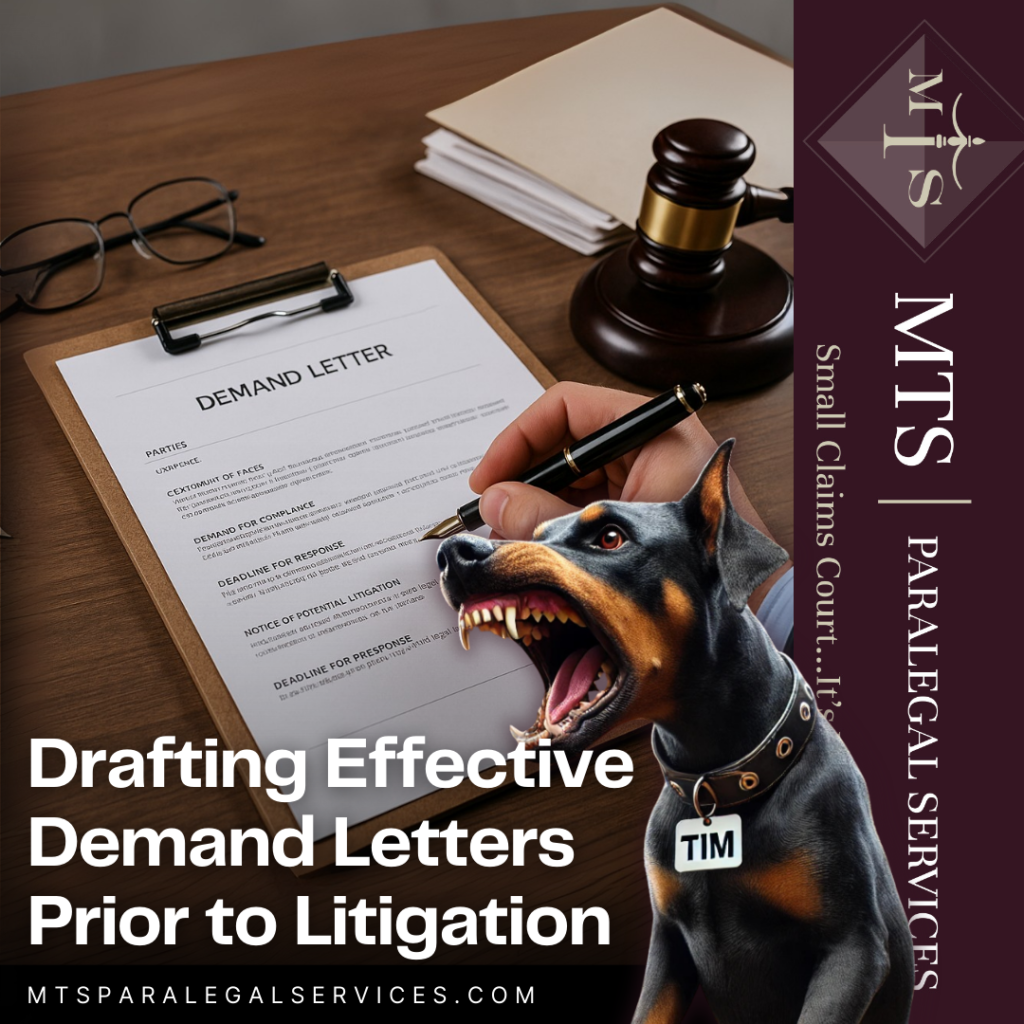
Drafting Effective Demand Letters Prior to Litigation
Demand letters serve as a pivotal instrument in the resolution of civil disputes prior to litigation. Within the context of Ontario law, such letters are not merely administrative correspondence; rather, they are formal communications intended to assert legal rights, request compliance, and, in some cases, avoid the necessity of costly and time-consuming court proceedings. An effectively drafted demand letter may encourage settlement, prompt repayment of debts, or rectify breaches of contract without resorting to Small Claims Court or higher judicial forums.
Purpose of a Demand Letter
A demand letter provides notice to the recipient that a legal claim exists and that further action will be pursued if the matter is not resolved. It sets out the factual background, the nature of the obligation, and the alleged breach or non-compliance. In Ontario, courts often view the sending of such correspondence as a sign of reasonableness, as it evidences an attempt to resolve matters outside of litigation.
When drafted by a trained professional such as Tim at MTS Paralegal Services, the letter not only conveys the seriousness of the claim but also complies with legal standards of clarity, precision, and professionalism.
Essential Elements of a Strong Demand Letter
To be effective, a demand letter should contain:
- Identification of the parties – The claimant and respondent must be clearly named, including proper legal entities and addresses.
- Statement of facts – A chronological account of the events leading to the dispute, drafted in a concise yet thorough manner.
- Legal basis of the claim – Reference to the underlying agreement, statute, or common law principle that gives rise to the obligation.
- Demand for compliance – A clear statement of what is being sought, such as payment of a specified sum, performance of an obligation, or cessation of a wrongful act.
- Deadline for response – A defined period, often 10 to 14 days, within which the respondent is expected to comply or reply.
- Notice of potential litigation – A statement that court proceedings may be commenced if the demand is not met.
Each of these components, if carefully structured, ensures that the recipient comprehends both the seriousness of the matter and the consequences of inaction.
Tone and Structure
The effectiveness of a demand letter relies heavily on its tone. It must be professional, firm, and respectful. Aggressive or hostile language can undermine credibility and may prejudice the claimant’s position should litigation proceed. Courts in Ontario assess the conduct of parties prior to trial, and unreasonable correspondence may adversely affect cost awards.
Tim at MTS Paralegal Services ensures that every demand letter is written with an academic and legally precise tone, balancing firmness with professionalism to achieve the intended result.
Strategic Advantages of Sending a Demand Letter
Drafting and delivering a demand letter prior to initiating proceedings offers several strategic advantages:
- Encouragement of settlement: Many disputes are resolved once the recipient realises litigation is imminent.
- Cost efficiency: Settlement through compliance with a demand letter avoids filing fees, legal costs, and lost time.
- Preservation of evidence: The letter serves as documentary evidence of an attempt to resolve the dispute.
- Demonstration of good faith: Courts view a party’s willingness to attempt settlement favourably.
By retaining a paralegal professional, a claimant ensures that the demand letter maximises these strategic benefits.
Common Mistakes in Drafting Demand Letters
Errors frequently reduce the effectiveness of a demand letter. These include:
- Failing to specify the precise amount claimed.
- Using informal or ambiguous wording.
- Omitting deadlines for compliance.
- Threatening unlawful or disproportionate consequences.
- Drafting without reference to the governing contract or statute.
Such deficiencies may lead the recipient to disregard the letter altogether, resulting in wasted effort and delay. Professional drafting mitigates these risks.
Demand Letters in the Context of Small Claims Court
Although demand letters are not a procedural requirement in Ontario’s Small Claims Court, they often serve as an important preliminary step. Judges commonly inquire whether efforts were made to resolve the matter prior to litigation. A well-drafted demand letter from Tim at MTS Paralegal Services demonstrates both diligence and professionalism, potentially strengthening the claimant’s position during the adjudication process.
The Role of MTS Paralegal Services
Located in Kitchener, Ontario, MTS Paralegal Services assists clients across Southern Ontario in civil litigation matters. Tim at MTS has extensive experience drafting effective demand letters that articulate the facts, legal framework, and remedies sought with clarity. By employing legally precise language and professional structure, Tim ensures that each demand letter communicates seriousness and fosters resolution.
Litigation can be resource-intensive, and parties benefit from every opportunity to resolve disputes beforehand. An effective demand letter often makes the difference between a swift settlement and a prolonged legal battle.
Individuals or businesses considering pursuing a claim are encouraged to seek assistance from Tim at MTS Paralegal Services. By relying on professional drafting, claimants safeguard their interests and increase the likelihood of achieving compliance without the need for court proceedings. For support in drafting or reviewing demand letters, visit mtsparalegalservices.com or contact Tim directly at (226) 444-4882.
This content does not constitute legal advice. For up-to-date guidance or legal advice specific to your situation, please contact MTS Paralegal Services or call (226) 444-4882.
